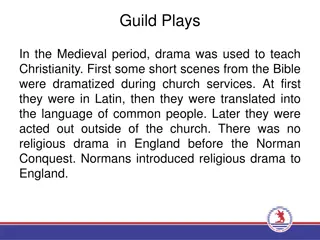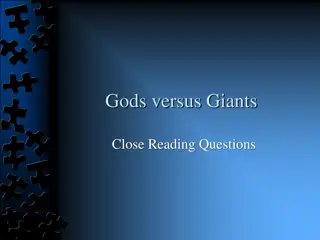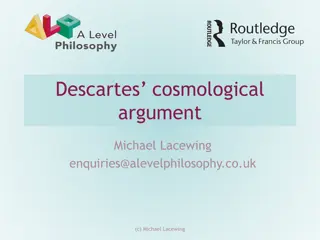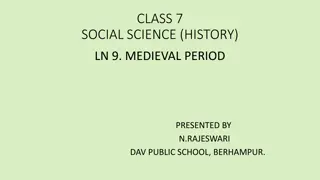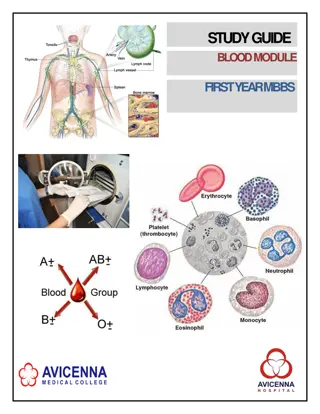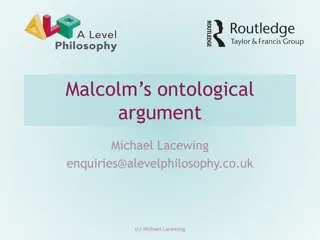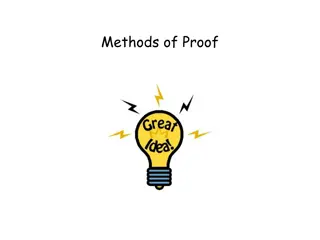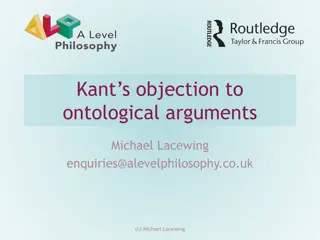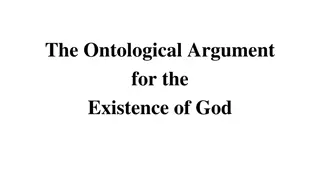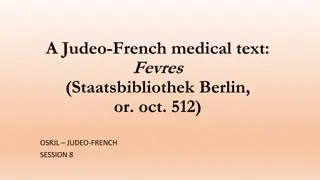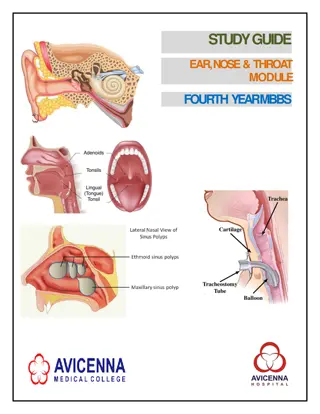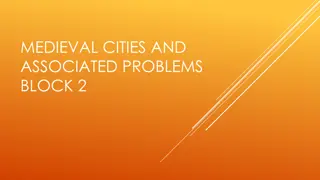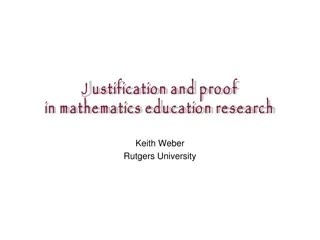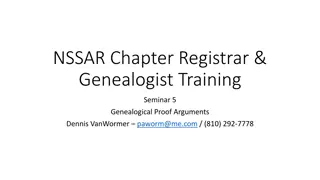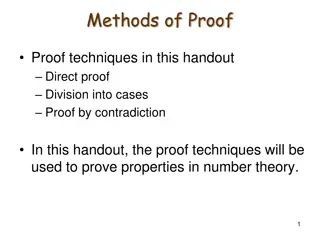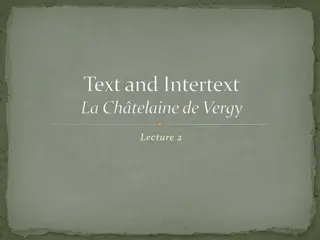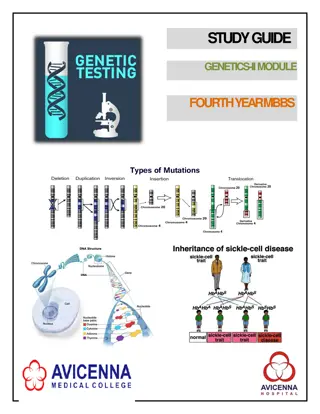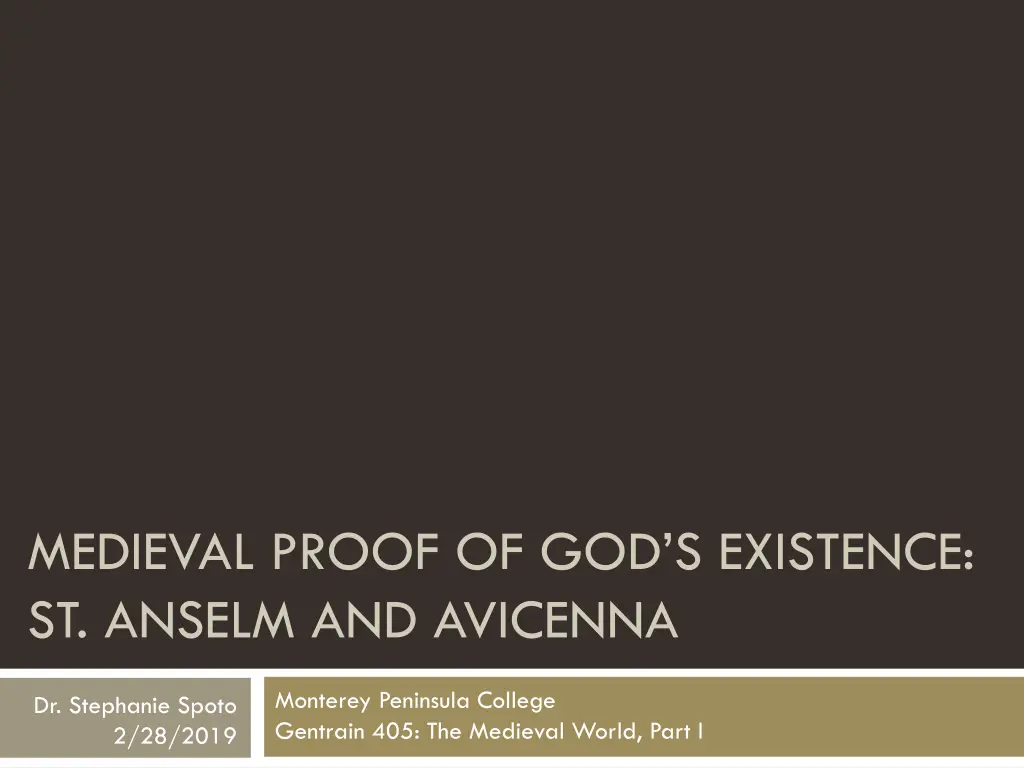
Anselm of Canterbury and Avicenna: Medieval Proof of God's Existence
Explore the thought-provoking arguments by St. Anselm of Canterbury and Avicenna on the existence of God in the medieval era. Delve into the ontological proof, intellectual climate, and Proslogion in this insightful discussion.
Uploaded on | 2 Views
Download Presentation

Please find below an Image/Link to download the presentation.
The content on the website is provided AS IS for your information and personal use only. It may not be sold, licensed, or shared on other websites without obtaining consent from the author. If you encounter any issues during the download, it is possible that the publisher has removed the file from their server.
You are allowed to download the files provided on this website for personal or commercial use, subject to the condition that they are used lawfully. All files are the property of their respective owners.
The content on the website is provided AS IS for your information and personal use only. It may not be sold, licensed, or shared on other websites without obtaining consent from the author.
E N D
Presentation Transcript
MEDIEVAL PROOF OF GODS EXISTENCE: ST. ANSELM AND AVICENNA Monterey Peninsula College Gentrain 405: The Medieval World, Part I Dr. Stephanie Spoto 2/28/2019
Faith and the existence of God St Anselm of Canterbury and Avicenna (Ibn-Sina) God is unseen Creates problems for religious people and philosophers can never confirm God s existence takes greater faith to believe in God Ibn-Sina (12th century portrait) St Anselm of Canterbury An illuminated archbishop presumably Anselm from a 12th- century edition of his Meditations
St. Anselm of Canterbury St. Anselm: 1033/4 1109 CE monk and the Archbishop of Canterbury Ontological proof: a philosophical argument for the existence of god. Argument a fascinating attempt to prove the existence of a God. Attempts to demonstrate that it is self-contradictory to deny the existence of God.
St. Anselms intellectual climate The role of theology: mere Bible commentary or the need for rational argument/analysis Bible commentary: God mysterious, inaccessible through senses/intellect Bible provides the symbolic language needed to talk about him cannot go past the symbolic language or infer truths by reason Rational theological argument: it is not only through symbolic language but reason which allows us access to faith Anselm s thought in the second group. The beginning of his Proslogian (c 1077): sin has so darkened our minds that we cannot hope to reach the truth unless God graciously leads us to it. He does so by offering us the truth through revelation and by inspiring us to accept that revelation in faith. Once we accept the truth on that basis, however, we can hope to reason out proofs for what we have already accepted through faith. God is rational, and what he does is rational, and we ourselves are blessed with reason. Thus we should be able to discover the rationality of God's actions, at least to some extent. We are like students who, unable to solve a mathematical problem, are given the answer to it and then discover they can reason out why that answer is correct.
Proslogion fides quaerens intellectum Note: something god-like = that-than-which- nothing-greater-can-be-conceived Anselm in the Proslogion: Even the fool is forced to agree that [something god-like] exists in his mind, since he understands this when he hears it, and whatever is understood is in the mind. And surely that [something god-like] cannot exist in the mind alone. Claims that God is the greatest being that can be imaged, and that the idea of him exists already in our minds.
In the Mind Alone? The first argument Suppose it exists in the mind alone: then it can be conceived to exist in reality; which is greater Therefore, if that [something god-like] exists in the understanding alone, the very being, [something god-like], is one that which a greater can be conceived. But obviously this is impossible. Hence, there is no doubt that there exists a being, [something god-like], and it exists both in the understanding and in reality. A mid-17th century line-engraved portrait of St Anselm by George Glover
The first argument One can imagine a being than which none greater can be conceived. We know that existence in reality is greater than existence in the mind alone. If the being we imagine exists only in our mind, then it is not a "being than which none greater can be conceived". A being than which none greater can be conceived must also exist in reality. Failure to exist in reality would be failure to be a being than which none greater can be conceived. Thus a being than which none greater can be conceived must exist, and we call this being God. 1. 2. 3. 4. 5. 6. Dr. Scott H. Moore s rendering
The Second Argument God is not self-contradictory God means that than which nothing greater can be conceived. The idea of God is not contradictory. That which can be thought of as not existing (a contingent being) is not as great as that which cannot be thought of as not existing (a necessary being). Therefore, to think of God as possibly not existing (as contingent) is not to think of the greatest conceivable being. It is a contradiction to think of the greatest conceivable being as nonexistent. Therefore, God exists. 1. 2. 3. 4. 5. William Viney s rendering
Avicenna (Ibn-Sina) The argument of dependency Some find Anselm s argument clever but unconvincing. Contrast it to his near contemporary Avicenna (Ibn-Sina) Early Islamic philosopher, c. 980 1037 Rather than abstract ideas about thought and ideas, Avicenna argues from a place of observation we can see that the things around us are dependent on one another.
Avicenna Avicenna Persian polymath (born in present day Uzbekistan) Memorized Koran by age of 10, and learned arithmetic from a grocer Troubled by Aristotle s Metaphysics as a teenager and began studying philosophy, but started to devote himself to medicine as his primary interest at the age of 16. One of the most prominent thinkers of the Islamic Golden Age (8th-14th century) father of early modern medicine Wrote around 450 works, of which 240 have survived Most famous works are The Book of Healing and The Canon of Medicine became standard medical text in many medieval universities until seventeenth century.
Proof of the Truthful In The Book of the Directives and Remarks Everything we encounter is determined by and dependent on something That something also has something beyond it, on which it is dependent it is guaranteed by its nature A conditional thing on its own can either exist or not exist, but requires some external cause to make it exist a catalyst For example, I might have existed or not existed, but some external catalyst brought me into being (my parents for example) The entire universe is dependent on something, since everything is contingent Therefore, the universe requires an external cause (a catalyst) to bring it into existence Therefore, there must be an external deity which is the cause for everything This deity is God. 1. 2. 3. 4. 5.
Contrasting Avicenna and Anselm Avicenna Anselm The domain of dependencies must have an external cause not included in set, therefore not dependent on anything Avicenna s Proof of the Truthful involves both arguments, but is more cosmological. Does not define God provides reasoning to derive characteristics That-than-which-nothing- greater-can-be-conceived must already exist in reality. Otherwise that same thing that exists in reality would be greater. Anselm provided an ontological proof, contrasted by what is known as cosmological proof. Ontological argument: God exists from the idea of God Cosmological argument: God as first cause.

